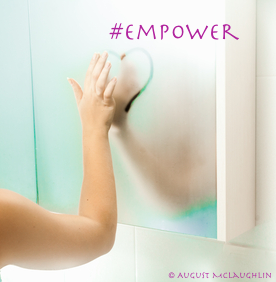At the gym the other day I overheard two women discussing the importance of inner-beauty. Minutes later, their topic shifted to a fad diet one was following in hopes of landing a “guy like this.” Perhaps she was referring to the guy’s wit and intelligence. But judging from the half-naked celebrities they were gazing at in a magazine, I had to wonder.
Many of us claim we value inner-beauty and health over appearance. But if our values mismatch our words and behaviors, which speaks louder?
There’s nothing wrong with admiring physical attractiveness, and for all I know, the women weren’t terribly serious. But their ellipti-chatter got me thinking. While there’s no shortage of “how to boost body image” information on the web, I’ve noticed some holes.
5 Myths About Low Body Image
1. It’s normal, and thus “no big deal.” Common, yes. But poor body image isn’t any more “normal’ than having a perpetual cold or flu. Also like illness, cases range from mild, short-lived and annoying to severe, chronic and life-threatening. Chalking body dissatisfaction up to “normal insecurity” makes us less likely to seek solutions and more likely to fuel the growing epidemic.
2. It’s a female (only) thing. Not anymore. Recent research shows that over 500,000 men in the United States undergo cosmetic surgery each year—many opting for more than one procedure. Magazine covers routinely feature men’s “rock hard abs,” and “miraculous” ways to get them. In any given week, the latest Hollywood “it” guys likely boasts a physique as unattainable for most men as super model physiques present for women. And the stats on male body image issues are low-ball, because men are far less likely than women to reveal these insecurities.
3. It’s less important than weight control. Imagine if rather than resolving to lose weight or bulk up next New Year’s eve, we resolved to embrace our bodies as is. Sound foolish? It isn’t. Self-acceptance makes way way for self-care. Healthy weight and muscle tone are common by-products. But many of us believe that if we just lost those 5, 10 or 100 pounds, or grunted our way to a six-pack, we’d feel better, look better, be better. On the contrary, countless studies link physique fixation and dieting with binge eating, increased stress, anxiety, sleep problems, weight gain, depression and obesity.
4. It’s the fashion/entertainment/advertising industry’s fault. It’s easy to point fingers, but it’s more complicated than that. If we didn’t support these industries’ ideals, they’d change. They can’t function without our support ($$$). Some argue that we’re brainwashed. In my opinion, that’s passing the buck rather than sharing it. Stronger contributors to poor body image include the diet and weight loss industry (another public-reliant machine) and our upbringing—such as the behaviors and attitudes modeled by our parents and other role models.
5. “If I accept my body as it, it won’t improve. I’d probably go off the overeating/weight gain deep-end. And besides, I can’t accept a body that looks like…this.” If this sounds like a quip from your mental diary, I empathize. But I also know what it’s like to prove these beliefs wrong. Little is as empowering as turning self-loathing into respect. And unless we flip that dark coin over, we’ll never know what we’re capable of. If this myth applies to you, imagine taking all of the energy, time, money and thoughts you invest into disliking, shrinking or sculpting your body into your wildest dreams.
 12 Effective Ways to Boost Your Body Image Here’s the good news. With awareness, desire and effort, we can improve the way we feel about ourselves and bodies. Not sure where to start? Consider the following.
12 Effective Ways to Boost Your Body Image Here’s the good news. With awareness, desire and effort, we can improve the way we feel about ourselves and bodies. Not sure where to start? Consider the following.
1. Make a list of wonderful things your body does for you. Keep it on your refrigerator, your dining table, in your car—where ever you tend to experience negative self-talk.
2. Look away from the mirror and into yourself. The more we fixate on our appearance, the more we judge ourselves and others. Spend as much time as you need before the mirror. Smile at yourself while you’re at it. 🙂 Poor body image often symptomizes a deeper problem—work stress, loneliness, perfectionism, fear… Addressing underlying issues makes way for improvement.
3. Trash your scale. Weighing ourselves can seem like a useful way to track physical health and weight loss progress. But weighing-in often is risky. We’re likely to mistake normal fluctuations for undesirable loss or gain. And health is far more complex than our weight in pounds.
4. Trade fashion and fitness mags for something better. Yes, there are exceptions. But by and large, the images, ideals and tactics presented in popular magazines aren’t helpful. Read empowering non-fiction and fantastic fiction instead. Get your news from magazines and health tips from qualified sources.
5. Just breathe… In effort to present a flat stomach, many of us have learned to “suck in.” This interferes with breathing, which can increase stress and other problems—including body image. Breathing exercises, on the other hand, promote emotional well-being. To learn more, check out Harvard Medical School’s Relaxation Techniques: Breath Control Helps Quell Errant Stress Response.
6. Give back. Volunteering can go a long way toward keeping our personal complaints and stressors in perspective. When we fixate on our bodies and appearance, we are highly self-involved. Becoming others-involved provides a positive means of distraction and emotional gratification.
7. Fight negative self-talk with gratitude. Counting blessings is more fulfilling than counting calories or body fat ounces. Every time a negative, judgmental thought enters your brain—about you or others—jot down something you’re thankful for. Gratitude is powerful medicine.
8. Swap porn for empowerment. There are many way to celebrate and nurture sexuality while enhancing body image. Generally speaking, hardcore, mainstream porn isn’t one of them. Read the Vagina Monologues. Practice self-pleasure. Try something new with your partner. If all of this is way out of your comfort zone, seek guidance from a qualified sex therapist. (If you do watch porn, consider feminist porn or consider these tips.)
9. Eat a healthy, happy diet. Eating well provides a broad range of benefits, including positive body image. Avoid dieting. Instead, aim for a healthy, balanced diet that contains a variety of foods. Pleasure, flexibility and “gentle nutrition” are important parts of a body image-boosting diet.
10. Exercise, but not too much. Physical activity helps the brain produce feel-good chemicals, improves overall physical health and guards against low body image—immediately, according to studies. And you don’t need to spend hours in the gym. Over-exercise can detract from body image as much as staying sedentary. Seek exercise you enjoy. Hike. Dance. Walk your dog. Play with kids. For most people 30 minutes or more most days is plenty.
11. Pursue your passions. A sadly common thread among people with severe low body image is a lack of passion. We can’t fix body image issues and recognize or our passions when we are enraptured by self hate and illness. Even mild body dissatisfaction can hold us back. The more we focus on our passions the less likely we are to view body shape, size or muscle mass as top priorities. And the happier we are, the more attractive we are to ourselves and others.
12. Seek support. Body image issues are contagious within families, classrooms and communities. Surrounding ourselves with people who over-value physical appearance increases our likelihood of the same. Seek friendship and support from others with positive values you hold and desire. And don’t be afraid to ask for help. Self-help books, support groups and therapy are valuable resources.
So what do you think? Does your body image walk match your thoughts and talk? Any trials or triumphs to share?



















